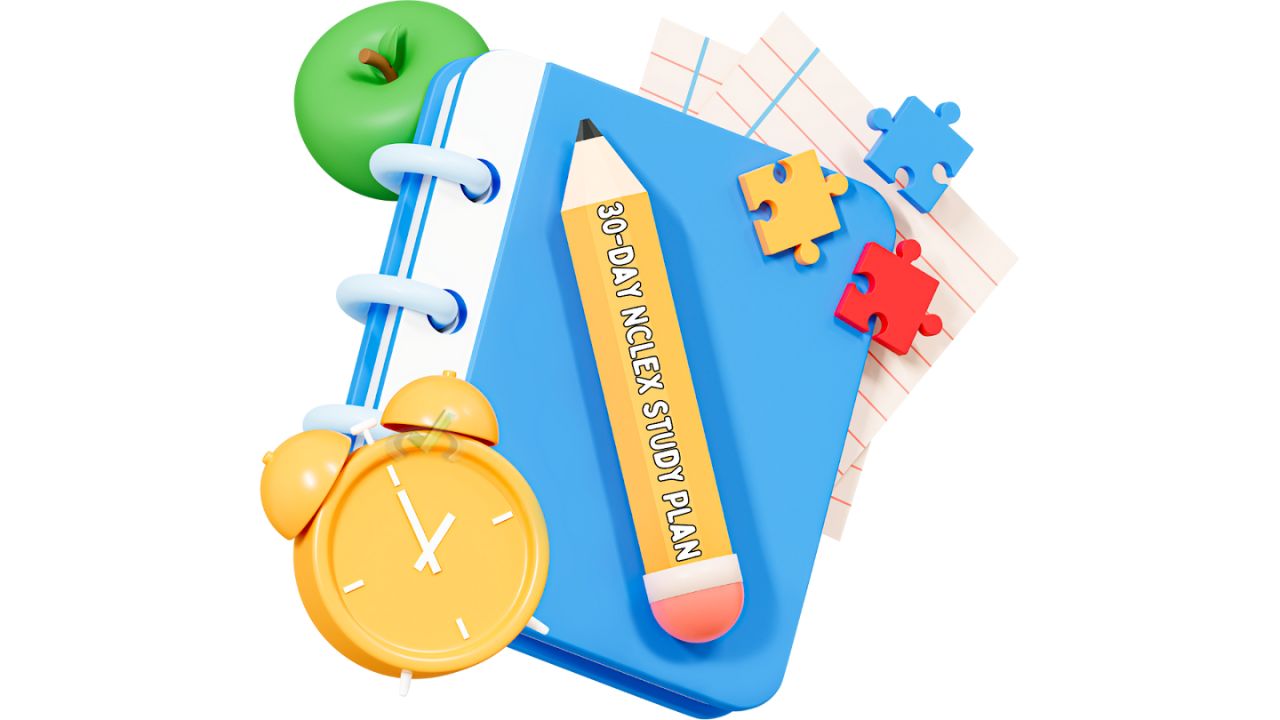The NCLEX is the final challenge standing between you and your nursing license. You have what it takes to conquer it, and I’ll show you how to do it in 30 days.
It’s true: According to the NCSBN, around 20% of first-time test-takers in the U.S. don’t pass the NCLEX-RN. That’s 1 in 5. But don't worry, 4 out of 5 do pass.
With a solid 30-day NCLEX study plan, you’ll be one of the four. Whether you start from scratch or need a push, this plan will give you confidence, focus, and test-day success.
Why You Need a 30-Day NCLEX Study Plan
Thirty days might not feel like much time, but it's enough if you use it well. You don't need 12-hour study days or last-minute cramming to pass. A steady, structured approach will help you review, practice, and succeed.
Here's why a 30-day NCLEX study plan is better than winging it:
- Stops you from feeling swamped by too much content.
- Builds good habits and stops burnout.
- Gives you enough practice to spot patterns in tough NCLEX questions.
It's about smart studying. This plan keeps you on track without too much stress.
Week 1 - Getting Into the Groove
There is just one thing to begin the first day: a plan. Scribble on a piece of paper, open a calendar app, or grab a planner. You must set aside particular hours each day to prepare for the NCLEX. Make it something you can see in front of you, and break it down by theme, issue, or whatever works best for you. Make a commitment to it.
Day 1: Know What You're Up Against
- Read up on the NCLEX test plan (available on the NCSBN website). Familiarize yourself with the format and the content you’ll be covering.
- Figure out how you learn best. Are you a flashcard fanatic? A visual learner who likes diagrams and charts? This will help shape how you study.
- Gather all of your resources, including internet resources, flashcards, and NCLEX study books. Organizing oneself is half the fight.
Days 2–3: Get the Fundamentals First
- The NCLEX isn't your average test. Because it makes use of Computer Adaptive Testing (CAT), the questions change according to your responses. They become harder the better you do. Fun, huh?
- To find out where you stand, take a lengthy practice exam. Right now, it's more important to understand your talents and shortcomings than it is to pass or fail. Consider it your baseline for the NCLEX.
Days 4–7: Establish the Base with Essential Information
- Get started by learning about the fundamentals of nursing. The truth is that you cannot simply "sort of" know these things. You must comprehend the reason behind it.
- Med-Surg Nursing: Fluid & Electrolytes, Respiratory Disorders, Cardiac Diseases. Think: what's happening and what should you do about it?
- Pharmacology: Drugs, side effects, patient teaching. Make flashcards and quiz yourself.
- Growth, developmental milestones, and the phases of pregnancy, labor, and delivery are all covered in pediatrics and maternity. The things you need to know.
Try to study for four to five hours every day. I realize it sounds like a lot. However, take breaks and switch up the topic to keep it engaging.
Week 2 - Ramping Up the Intensity
Alright, now it's time to begin practicing now that you understand the basics. The focus this week is on practice questions. many practice questions.
Days 8-9: Question Banks and Rationales Are Your Best Friends
- Aim to do at least 75 questions a day. You can use UWorld, Kaplan, Saunders—whatever you prefer. The key? Don’t just answer the questions and move on. Review the rationales for every single one. Right or wrong, there’s something to learn from every question.
- Ask yourself why you got it right or wrong. Was it a knowledge gap? A tricky wording in the question? This helps you understand your patterns.
Days 10-11: Systems Approach
- Go system by system. One day, it’s Cardiovascular. Another day, Respiratory. By focusing on one area at a time, it’s easier to see how everything fits together.
- Create flashcards for common diseases, signs and symptoms, and nursing interventions. Keep them on hand and quiz yourself during downtime—waiting in line, on a commute, or even during lunch.
Days 12-14: Test-Taking Strategies
- NCLEX questions have a rhythm. And once you learn that rhythm, it’s easier to spot the right answers.
- Practice strategies like:
- Eliminating wrong choices quickly.
- Focusing on patient safety (the ABCs: Airway, Breathing, Circulation).
- Remembering that NCLEX loves to test on prioritization—think about what's most important to address first.
Week 3 - Active Learning for Retention
By now, you’ve built a solid base. But it’s not enough to just read and reread. You have to use what you’ve learned. And the best way to do that? Teach it, say it out loud, and recall it actively.
Days 15-17: Active Recall & Practice Tests
- Familiar of the term "active recall"? It’s basically where you put the books down and force your brain to pull out info. No peeking. It’s hard, but it works.
- Go over questions, but also try to summarize concepts without notes. Think about a topic, say cardiac output, and try to explain it out loud to yourself (or your study buddy, if you have one).
- Take another practice test at the end of Day 17. Compare it to your first test. I bet you’re already seeing improvement.
Days 18-20: Teach to Learn
- If you can teach it, you know it. Try teaching your family, your pet, even the mirror (the mirror is great; it doesn't interrupt). This process solidifies what you know and highlights what you don’t.
- Join a study group or find a friend also prepping for the NCLEX. Reviewing challenging ideas once or twice a week might be beneficial, but you don't have to study together every day. You gain new insight reviewing challenging ideas once or twice a week might be beneficial, but you don't have to study together every day.
- You gain new insights, and let's face it, learning is more enjoyable when you're among others.
Days 21–22: Pay Attention to Your Weaknesses
- Everybody has them. These are the subjects that make you say, "Nope." Spend these two days concentrating on your areas of weakness. Focus on prioritizing if it's difficult.
- If pharmacology makes your eyes glaze over, go over the top 20-30 meds that nurses need to know.
- Stay focused while keeping it light. Reward yourself after each good study session because you're almost there.
Week 4: Finalizing and Getting Ready for the Test
You're nearing the end at week four. Putting things together and getting ready for the big day are the goals of this week.
Days 23–24: Make It Seem Like Test Day
- Nerves on test day are a major problem. Take full-length tests as if you've already passed them. Set a timer, find a quiet place, and finish the exam all at once.
- Practicing like it's the real thing helps with timing and keeps your stamina strong. The NCLEX isn’t a sprint; it’s a marathon.
Days 25-27: Keep Practicing, Keep Reviewing
- Keep those practice questions coming, but now focus on mixed categories. You want to train your brain to jump between topics quickly, just like it will on test day.
- Quick reviews of notes, charts, and flashcards help keep everything fresh. And if you’re a visual learner, go for quick-hit videos or listen to podcasts for some variety.
Day 28-29: Light Review and Relaxation
- Easy days. These last two days are for light review and relaxation. This is not the time to cram every detail.
- Do something you love—go for a walk, hang with friends, watch a movie. Eat well, breathe, and get enough sleep. This is yours.
Countdown to the End on Day 30
- It is present. You are prepared. Eat a healthy breakfast, prepare your materials the night before (ID, email confirmation), and feel like a pro when you take the test.
Test Day: The Crucial Situation
- Inhale, you're prepared. You will reap the rewards of all those questions, practice, and content. This 30-day NCLEX study plan has prepared you step by step to pass. Trust your prep, trust your gut, and conquer the NCLEX.
Quick Tips for an Effective Study Plan
- Study Smart, Not Hard: Study smart, not hard. The NCLEX tests your ability to apply knowledge, not just memorize facts. Focus on understanding concepts.
- Daily Study is Better Than Cramming: Consistency wins. Marathon sessions are always inferior to a little bit each day.
- Remain assured: You can succeed.
Conclusion: An NCLEX Study Schedule for 30 Days
An effective 30-day NCLEX study plan must include memory, relaxation, practice, and review. If you are prepared, organized, and consistent, you will be able to overcome any challenge on test day.
Keep your chin up, be positive, and never forget that you worked hard. Now is your moment; you're prepared and ready. You'll perform this perfectly!




